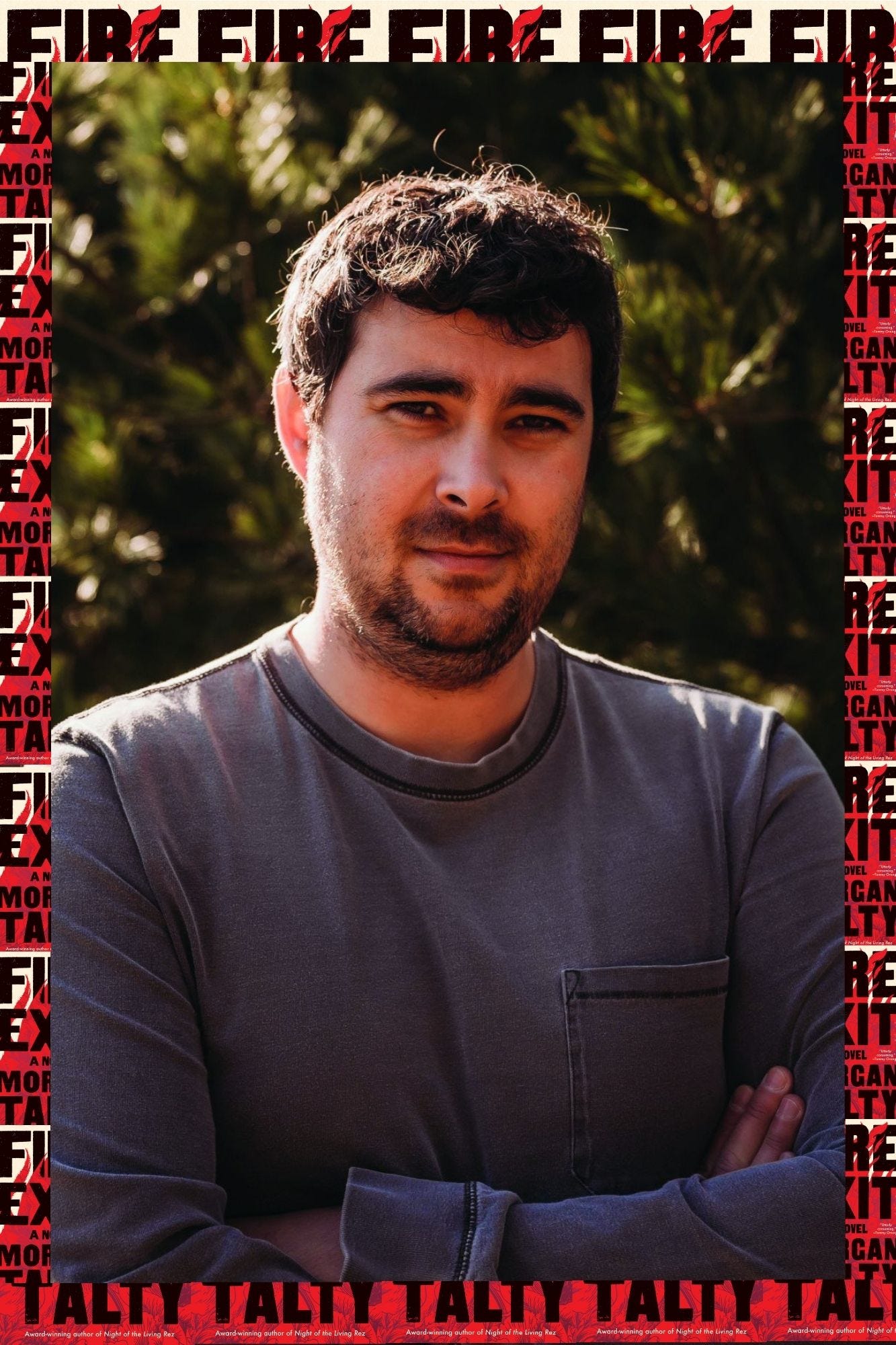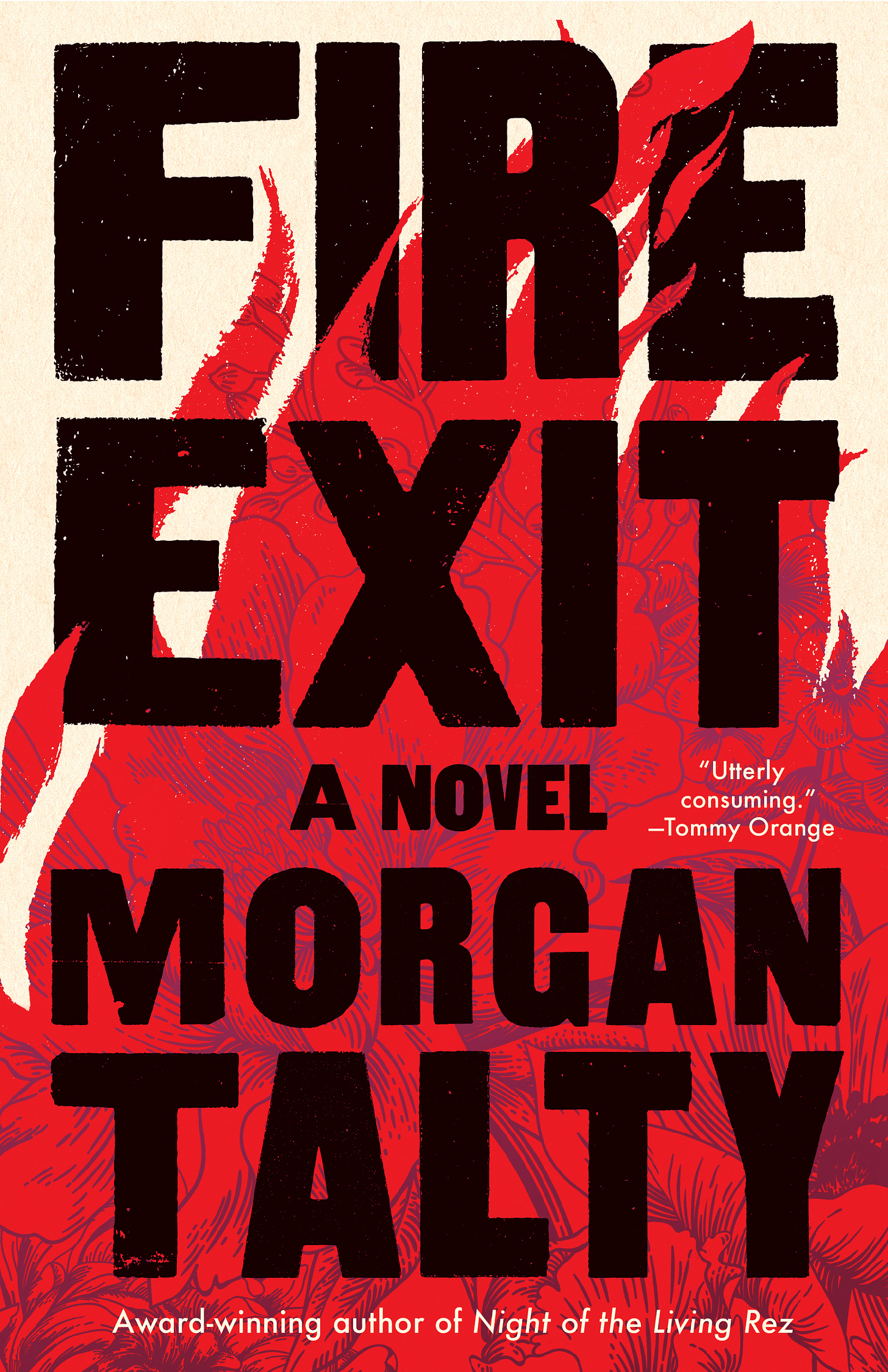Read to Know Basis is a weekly interview series with authors. It features debut authors and established writers talking about reading, writing, and of course snacks. This series is free to all. If you like what you read considering subscribing to support the work of Unstacked, and of course go out and buy the book!
Morgan Talty is a citizen of the Penobscot Indian Nation. His most recent book is the debut novel Fire Exit (Tin House). His debut short story collection, Night of the Living Rez, won the PEN/Robert W. Bingham Prize, the American Academy of Arts and Letters Sue Kaufman Prize, the National Book Critics Circle John Leonard Prize, the New England Book Award, the National Book Foundation’s 5 Under 35 Honor, and was a finalist for the Barnes & Noble Discover Great New Writers Award, the Andrew Carnegie Medal for Excellence in Fiction, the Mark Twain American Voice in Literature Award, and The Story Prize. His writing has appeared in The Georgia Review, Granta, Shenandoah, TriQuarterly, Narrative, Lit Hub, and elsewhere. Talty is an assistant professor of English in Creative Writing and Native American and Contemporary Literature at the University of Maine, Orono, and he is on the faculty at the Stonecoast MFA in Creative Writing as well as the Institute of American Indian Arts. He lives in Levant, Maine.
What are five words to describe your book?
Hopeful, thorny, misunderstood, inclusive, and a story.
What is the strangest thing you googled while researching/writing this book?
Strange, definitely, but perhaps more disturbing: videos or images of violence regarding child abuse; videos or images of Electroconvulsive therapy; and videos or images of people suffering from Alzheimer's.
I also Googled quite a lot things like, “Why the fuck won’t Word get rid of this fucking page break? Does it want me to fucking throw the computer out the window?”
Describe your ideal reader?
I don’t have one. I mean, I guess if I were forced to say, I would say someone who has the ability to feel emotion and can agree to meet me halfway as a storyteller. But in general, I don’t really think I consider readership when writing fiction. Consciously, that is. When writers say they don’t think about audience, they actually do. If we’re writing a story that makes use of POV, voice, characters, plot, imagery/setting, and so on, those are parts of creating a story, yes, but they are also expectations for readers. So to me, to write using the tools we have developed or discovered as writers means we are engaging audience or selecting our readership without knowing it.
What is the best part about being an author? What is the worst part?
The best part is when you leave your house and people are like, “Hey. HEy. HEY. HEY! It’s that author guy!!!!! It’s him!!!!!!!” and they swarm you and give you money and ask you to sign their books and are like, “Let’s get a selfie!!!!!!” and then the crowd–which you’re like, for a moment, where did they come from? I live in the middle of nowhere–the crowd lifts you up and the whole time you’re like, “Emily Dickinson’s ‘Heaven’—Is What I Cannot Reach!’ is all wrong, because I can grab that apple hanging right there–
–but then the worst part is the crowd–mob?--always drops you right before and then you’re like, “Dammit, Emily was right.”
What is the single biggest distraction to your writing?
These days? My adorable son, Charlie, when he shits his pants.
What is a piece of writing advice that you’ve received that you think is really bad? What is a piece of writing advice that you think is really good?
I’ll start with the best: “Make something inexplicable happen and then work to reconcile it, to make sense of it, while being specific,” which Rick Bass told me. And there is another one Cara Hoffman said, “You have to become your own best teacher.”
As for the worst writing advice? All of it. Really. Except if it comes from someone who knows my work. All “rules” or “tendencies” in writing exist in the context of the work that has used it. In my mind, there are maybe one or two or three or four real principles about writing that exist. There might not even be any.
What are you reading right now? And what book are you desperate to read next?
I’m reading Swift River by Essie Chambers. SO. GOOD.
And I’m dying to read The Road to the Salt Sea: A Novel by Samuel Kolawole
What book are you an evangelist for?
The Lesser Blessed by Richard Van Camp
What is a great fact you’ve learned from a book?
I don’t remember.
Who is your literary crush?
Not sure how we’re defining “crush” here and if we’re supposed to stick to our sexual preferences (I’m straight but know when a man’s got the looks, as do all other men so quit lying), but I’ll go with pure looks I find appealing and their voice on the page: Jack Kerouac.
If you could not be a writer what would you do?
I’d teach writing. But if that’s a cheap answer then I would be doing manual labor, like working for a moving company.
You’re invited to a literary potluck, what are you bringing?
I mean, this is tough. Like, who is there? And are they alive or dead? Really. I’m stressed about this question. Like, is Charles Dickens there? If he is, do I bring baked apples? Also, am I responsible for this entire thing? I know it says I was invited, but I can’t help but to feel responsible for all these random authors–for some reason they are all dead–I’m imagining there at the potluck. Like, are Mark Twain and Jane Austen there, and are they far enough away from each other? Is Aristotle there, collecting peoples’ tissues or handkerchiefs so he could look at their “brain matter”? And does Aristotle accidentally collect a sixteen year old Marcel Proust’s tissue? What about Gertrude Stein? Is she there with her poodle, Basket? If so, is H.P Lovecraft there and is he ok?
Now I’m like, what if a living person is there, like Jonathan Franzen? If he’s there, he’s gonna be going around telling everyone about the future and how much he hates social media and the internet and e-books and anything that advances civilization. Now that I think about it, he seems to be the best fit for the only living author to be in attendance.
But still I’m stressed from this.
And Dickens took the baked fucking apples.
Connect with Morgan: Substack | Instagram | Twitter | Tiktok | Website




I really like the Read to Know Basis interview series! It offers great exposure to debut or previously unknown to me authors. In this case, I really loved Morgan Talty's short story collection but hadn't heard much about his debut novel. The cover art looks cool.
So good! This one is on my tbr. Love Maine authors!!!